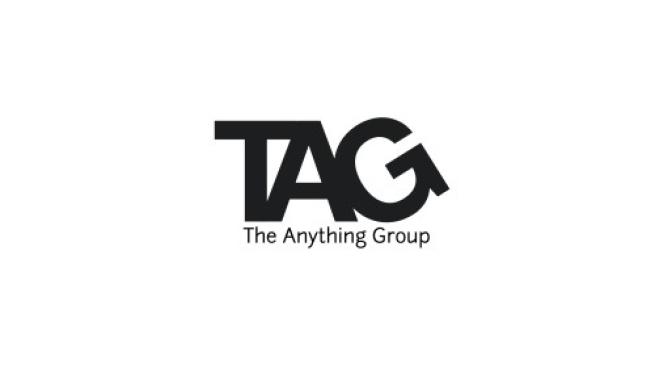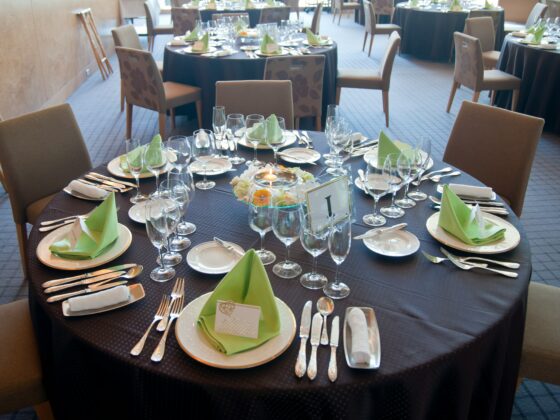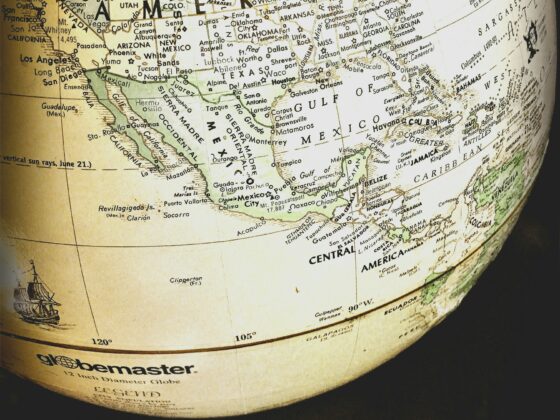Rob: I think anyone who’s sort of in our world knows that Life House and Lark have been competitors for the last five years. We live in the same space, historically have lived in smaller independent properties that need help driving money to the bottom line. And I will tell you that there’s been no company out there that’s made me sharpen my pencil or think more clearly about who Lark is in contrast to Life House and in comparison to Life House. And so, When we started this conversation between Life House and Lark about six months ago, we just threw everything out on the table. Is there an opportunity to scale? How would scale benefit if we came together? What are the benefits of coming together? What are some of the potential pitfalls? And it really came together interestingly, just by forming a personal relationship with the new leadership at Life House. After the former CEO of Life House left, they hired Chris and Mark as their CEO and CFO, respectively. And I was kind of sitting on the sidelines waiting to see what would happen, like the rest of the hotel world. Well, what’s going to happen? How is it going to evolve? What are two tech guys, two people who aren’t hoteliers, going to do with the company? And I watched, and what I kept seeing is that things were stabilizing, things were improving, the ethos was getting better. We know that the people who work there, the culture, and the performance at the properties are improving. So when they called, they said, this is a really interesting time to have a conversation. So Mark, who’s the current, the former CEO of Life House, called and said, hey, would you guys just want to talk? So we went to Montreal. We sat in a room for three hours together. We really liked each other. I loved what I heard about the values that they were imparting. And we said this could be interesting. It could be interesting to bring two similar companies together at different stages of evolution to create a platform that doesn’t exist as broadly as what we are now. So it took about six months, a lot of conversations, a lot of in-person meetings. I think one of the guys who was advising us said, you have to get comfortable with them so much so that you would let them care for your children. We got comfortable. Then, we just started crunching numbers and looking at our respective portfolios and decided that the typical outcome of a merger, JV, should be 1 plus 1, which equals something greater than 2. And we convinced ourselves that would be the case.
Josiah: I’d love to get into some of the components that go into this. I want to give people a little more context. I’ll link in the show notes to some of the earlier conversations that we had. But for people who are just listening to us for the first time, You have a really interesting perspective on growth in hospitality and boutique hospitality through what you’ve done at Lark to date. And I wonder if you could share a little bit of your philosophy about how you’ve thought about building a skilled boutique lodging company at Lark.
Rob: My perspective has always been that there was space in our market for more sophisticated operation in smaller independent hotels, that typically an owner innkeeper or a proprietor in a small hotel is doing everything, right? They’re ironing the sheets. They’re making the muffins. They’re taking the reservations. They are stretched. They’re their own company in one person. And because of that, unless you work 48 hours a day, which you can’t, there are really opportunities to help in those situations. And so my original thesis was that New England in particular has this amazing history of hospitality that goes to pre-revolutionary war, right? And yet, it had become a little stuffy and a little bit prescribed. And really, there are so many modern pops out there that we thought if we brought, like I said, a level of sophistication, a new lens on what we felt travelers were looking for, which in my opinion is not doilies and communal breakfasts and all that kind of stuff. It’s really just experience community, travel on your own terms, and feeling like where you are today rather than 200 years ago. And so as we began to scale, it was through real estate development and brand development, but people started seeing what we were doing and said, hey, that looks like it’s working. We never thought that could work. So can you help us with it? And so our growth at Lark has been rather organic by people seeing that there’s a different way to do things that makes sense and tagging along and saying, hey, can you help us? And we’re all about relationship and excitement and adventure. So we now support, pre-merger, pre-JV, we supported just over 50 properties of this ilk, like independent spirited, design forward, under 100 keys. And now what this coming together does for us is it adds another 40 or so hotels to the portfolio where we can layer on what we’ve done, I think, well to date in the LARC portfolio with all of these new ownership groups who have just started having conversations with and who are wonderful and have passion for what they’re doing. And yet, I think we can bring a new level of support and attention and sophistication to that group and sort of in our next stages as we grow as well.
Josiah: So this is an exciting announcement. It’s kind of unparalleled because what we’re seeing more and more of is large hotel companies buying up smaller brands. You forming this joint company gives you scale that is really remarkable. And there’s already around a billion in assets under management as part of this combined company. It seems there’s room for growth here. I think about some of the factors that have caused you to grow so far. A lot of it is that point of view, that unique way of operating that you just outlined. I’m curious how you think about scale in the boutique lifestyle lodging space, because historically that’s been a big challenge. What gives you reason to believe that you can take this and grow it further?
Rob: I think that we’ve seen consolidation in many ways. You saw Pyramid and Benchmark come together. Interstate and Ambridge come together. And the idea is we are better able to, with a really strong suite of centralized services in the boutique independent space, and particularly on the sub-150 key hotels, if we have the infrastructure in place, which we do, we can support properties that can’t support their own infrastructure. Right. So if I have a 95 room hotel in Martha’s Vineyard, I’m not going to sit a controller there or a head of marketing or revenue manager, but I will have them anywhere in the country because we’re remote. Right. Our people, our centralized team can work anywhere. And so we can attract the best people who are not just passionate about accounting or revenue manage, but they’re passionate about the particular space we’re working in. Because all of this team could go work at Marriott or Hilton or like some actuarial accounting firm, but they love the passion of what we do. We brought 23 people, really great people over from Lifehouse. And so we now have about 90 people in our centralized service team, what we consider to be our property support team. There’s nothing that we do that doesn’t involve people on the ground on our properties, right? And so everyone who works outside of our properties, they’re in service to the mission on property. And so because we have this team, this really robust, awesome team, That is the critical piece to scale. We’ve got people all over the country doing the good work. And now we have properties in 27 states and two countries where we can hub and spoke from to support other new properties. So it’s not like for us, it’s not about putting a random dot on a map. It’s about strategically thinking about what that dot can then become around it and how we can support new owners and existing owners by being at a larger scale.
Josiah: Fantastic. So people often talk about people being integral to success and hospitality, right? And so scale allows you to hire some phenomenal, talented people, and I’ve met a number of them already. I’m really excited to see where this goes. I want to get into a few other elements that will allow you to scale that you have spoken about. In the announcements, you mentioned repeatedly the importance of technology having a nimble tech stack. But I think back to Lifehouse, as I understood, they always led with technology too. So this seems a common cultural thing. I think on LinkedIn, you also posted where Mews is the heartbeat. I’m curious to hear you elaborate a little bit more on what you see as the role of technology in all of this today and where it can go moving forward.
Rob: Thanks for asking. I think that it was a totally different conversation 10 years ago than it is right now. I remember my first job at the Sherbourne Inn in Nantucket. I was filling out reservation cards and had the tape chart of my backpack when I was walking around town with a cell phone so I could take reservations. It has changed a lot, right? My general take on this, and I think our company philosophy, is that we have to be nimble in the tech space. And so the heartbeat is the property management system. And the flexibility that Muse gives to plug things into it is what makes it so great, one of the things that makes it so great. We always want to be able to plug in and unplug things as better things occur. So what we don’t want and don’t believe in doing is having an enterprise system where everything is one. So right now, we have Mews. We use Flyer for hospitality, which is a fantastic revenue management tool. We use HIA, which is Hotel Investor Apps, as our accounting platform. They all plug in. And so the purpose, to me, of technology is to smooth the path for people. It’s not taking over. But I don’t want my GM to have to mail a receipt into the central accounting office so they can enter it. So we use Fractura to do that. And it goes automatically into HIA. And Muse does daily reports to HIA. So it really creates an ecosystem that allows for efficiency and accuracy, which is essential when you’re working with smaller key counts. Because every dollar at an 18-room hotel is a lot more important. And I’m not saying it’s not important at a 400-room hotel, but if that $1 doesn’t drop to the bottom line with 18 rooms, it’s very meaningful. It’s not a rounding error. And so we use tech to keep us on point and to keep us efficient. We’re not using it to replace humans, but what it does is essentially it makes our lives better and ultimately allows us to be more transparent with owners. And owners are a really important piece of this picture. I own hotels. I want to know what’s happening. And if I can log into an owner portal, or I can get transparency into things beyond a monthly reporting package, it’s going to make me much happier.
Josiah: It’s so important and it provides so much opportunity to grow. So it puts you in a good position to do that. I want to talk about something else that’s really key for scale as well as driving direct revenue. This came up in a number of your comments around this. One of those specifically I’d like to hear your perspective on is the power of your loyalty program. I wonder if you could describe that, you know, kind of like, what is it? How’s it going? And what’s the potential you see there?
Rob: We’re really proud of our loyalty program. We’ve been around for 10 years and it’s not huge. We call it On the Lark Club. It’s got about a hundred thousand members that are very active. And it’s important to talk, like we have a lot of hotels in our portfolio. We have branded and unbranded. So independent, truly independent with no brand affiliation, white label management. And then we have hotels that are in our brands. So Bluebird, Lark, AWOL, Blend Tiger, Life House. that have a loyalty program. So our branded portfolio gets the benefit. And so we were running some numbers last quarter, and it showed that 30 to 33% of our portfolio’s revenue came from those 100,000 people, those loyal guests, right? So once you have the guests, if you treat them well, they’ll come back, right? And if you talk about it from a X’s and O’s or one and two perspective, it’s the cost of acquisition of a new guest is much greater than the cost of acquisition of a loyal guest. And so as a management company and a brand, in order to create value for the hotels in our portfolio, we want this program to be robust. And if you can get 33% of your revenue from a group of people that decided they’re going to go to a Lark Hotel no matter where it is, It costs nothing. It’s not commissionable. There’s no commission on that direct revenue from a loyalty perspective. And so what we hope to do as we continue to evolve our family of brands is we hope to bring that value. Lifehouse historically has not had a loyalty program. So I think I see immediate benefit to the owners of the three current branded LifeHouse hotels, bringing them into the fold and driving more direct revenue to them. But also we’re working on the development of a collection brand that will hopefully bring some more properties within the management portfolio into a collection brand that will allow our loyalty members to experience more hotels and the hotels to experience more direct loyalty revenue.
Josiah: I find this fascinating. It really underscores the power of this partnership and this merger where you’re bringing more scale, you can do more things with this. I was reading some of the commentary of others in the industry around this and, you know, I think some had questions around, you know, what’s the end game here? You know, is this a roll up and then you sell to a big hotel company. And then I saw you talk about something about like the power of kind of building something small when there’s creativity and things you could do. So I guess to make this more of a question, I guess, like, as you look into the future, what are you excited to do with this, this combined company now?
Rob: So that’s a very good question. There are so many things I’m excited about. I have to think about it a little bit differently than I have historically, right? Because I was a sole proprietor of Lark Hotels. I now have a lot of partners that have expectation of shareholder value. And so it’s important in everything that we think about with a fiduciary responsibility to owners and investors that we need to drive value. And so there are a lot of ways to drive value both in Lark and for the hotels that we represent and that we are stewards of. And I think one of the best ways to drive value is by propagating brand and loyalty, right? So if we look at Lark Hotels as a collection brand, if we look at Life House as a brand, AWOL as a brand, Bluebird and Blind Tiger, they all have inherent value because there’s loyalty connected, there’s distribution connected. It’s easier to make those properties sing than it is a standalone independent. And so as we think about adding value for stakeholders, owners, guests, all of them, we want to continue developing our family of brands. And I think that’s one of the ways that we as a company previously and currently are unique in the hospitality world. We’ve seen, you and I, everyone in the world has seen brands sell into the bigs, right? A Standard and Bunkhouse recently, Graduate recently. We don’t need to go into all of them, but they see value, they’ve seen value in the distribution of the big players. And I admit it’s totally there. But I would say, I’ve spent years just talking about this, if you have to send 12% of your revenue up the flagpole, you better get a lot of value from that, right? If you can work with an independent brand like Lark, and I’m sure there are others out there, I can’t think of any off the top of my head right now, and there’s a loyalty program, and you’re getting management and brand for well under that 12%, you’re getting a lot more value built in your property because there’s more cash flow into the bottom line, just put a cap rate on it, and it’s more valuable. So there’s value at the stakeholder level, right? At the ownership level. But thinking about value for shareholders and investors in Lark, the more brand value we build, the more revenue that comes into the company, right? Because we’re not just altruists, right? I’d love to be able to say, hey, have access to our loyalty program, it’s totally free. But at the company level, we wanna continue building relationships with owners and developers that want to create high value assets. that will drive our top line revenue, right? We want to create value and brand that will, as we know, like it’s kind of ethereal, right? Hey, Ace is worth this much. Graduate’s worth this much. It’s really worth whatever anyone’s going to pay for it. But there’s truth and strength of brand because we, brand is strong because of loyalty, because people know what they’re going to get and because it’s a little bit safe, right? So choosing a Lark Hotel or choosing a graduate or choosing an Ace, you kind of get the idea, you know what you’re getting when you go. And it could be like wildly different at each Ace Hotel, but you know, when you go to an Ace Hotel, it’s going to be a little gritty, it’s going to be awesome, service will be cool. It’s different when you choose a one-off independent or mom and pop. Often the web presence isn’t that great, you’re kind of taking a risk. And so if we can build our brand portfolio, give people assurance about who we are, what we’re doing, I think that drives value for guests, for Lark as an entity, and for owners.
Josiah: I appreciate you getting into this, though, because if I look at kind of the critical recognition and the guest recognition of the quality of your guest experience, that is clear, right? People can go do their research themselves. They love that. I think showing the value to developers, to hotel owners is also clear, because I’ve seen this done and I see you doing this where you can create more profits because of how you operate. I think what I’m especially interested in is the combined entity for your investors into Lark itself, because I think it is very clear we’re exiting to a big a hotel company is a payday for everyone. But what I’m hearing from you, and correct me if I’m wrong, is there’s also a world where you can do right by your investors into Lark by making that a profitable business. And then the value of that increases, you could probably spin off cash. So I guess I’m hearing from you an alternate path to do right by your investors than just selling to a big hotel company.
Rob: Yeah. I think the important thing when you’re in an enterprise like this is there has to be optionality. And if you build value and it’s value on an ongoing basis for the next 100 years, great. If you build value and it ends up with a core knocking on your door and part of the investors choose to exit at that time, great. The main purpose is building value for all stakeholders. It’s not just a hobby, right? We’re in business. And if we do well at our business, it builds value for everyone, right? If you have happy guests, you have happy staff. If you’re happy staff, you have happy owners. If the business is profitable, you can do more things for everybody. And that’s true at the high level corporate umbrella as it is at the individual property level.
Josiah: So I want to close on kind of a bit of a personal note. You mentioned in your announcement something that caught my attention, and hospitality can be a very ego-driven business. You posted something to the effect of, you know, kind of this joint venture required putting aside egos to some extent. I wonder if you could share with our listeners a little bit what that was like, because I want to see more of this sort of, how do we collaborate to move hospitality forward? What was that like, I guess, on a personal level behind the scenes?
Rob: So it was really, it was an incredibly rewarding experience. I say this all the time. I was an English major. I learned how to be an innkeeper. I learned how to run a company by doing it. And I learned how to bring two companies together by doing it. It was like, I learned so much. I feel like I got at least an associate’s degree in mergers and acquisitions over the last six months. But I will tell you that the people at Lifehouse and at Inovia and at Thayer, who were their major backers, couldn’t have been better, couldn’t have been less focused on what they want than what they thought could happen if we came together. And I think that was the main thing. We were able to set aside whether, hey, will Lark survive, will Life House survive, will this be called XYZ new or whatever, because we quickly aligned on a shared vision. that we knew would be good, not only for us, but for the people we work with. And each company has historic strengths. And like I’ve said, and we could have another conversation about this, every management company has a weakness. It’s just about whether you know what it is and if you can address it, right? You just have to know where your weaknesses are. And I think we’ve found a good combination of strengths and that made it easy. You know, we came to alignment pretty quickly. I thought in the first meeting we were kind of feeling each other out. We didn’t know what position each company was in because we’re sitting in a room we’d never met. And I was thinking to myself, is this company going to be called Lifehouse? Or is it going to be called Lark? And I found myself checking myself and asking if it mattered. And honestly, when you spend 10 years building something and it has an identity, It’s like you are a child. It’s like an offspring. And so I found that I did have some ego involved in it. And it all turned out well for my ego because the new company is called Lark. But if it had been something else, I think that I kind of came to a reckoning with, I know this is going to be good. I know the teams are going to be better off. I know that I’m going to enjoy who I’m working with because how we form this relationship. And ultimately, it’s the right thing to do. So if we have to call it Josiah’s Hotel Company, then we have to call it Josiah’s Hotel Company. Okay with that. Yeah. That’s how it all has to work, right? Look, you’re a relationship person. You understand, like, I think that we constantly remind ourselves that we’re all about people. We’re not about assets. We’re not about buildings. We’re about the people in them bringing things to life and affirming other people’s experiences, no matter who it is. in our lives, like my mom, my kid, but in our business, our guests, our owners, our staffs, our shareholders. And we just happen to be involved with something that’s sexy and awesome and cool and fun, right? It would be hard for me to do this from a CPA seat, but the cool thing is we get to work with people who want to bring people’s dreams to life.
Josiah: Well, what an exciting announcement for everyone involved. Rob, I always enjoy our conversations. I really appreciate you taking time to share some of the story behind this, some of the exciting things that are going on. I’ll include links in the show notes where people can learn more, but thanks for taking the time to talk today.
Rob: Yeah, pleasure, Josiah.






